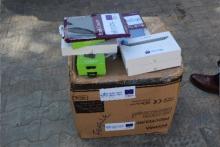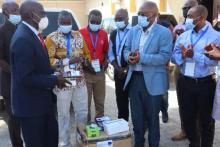WHO strengthens surveillance system, leverage collaboration with traditional leaders on health in Borno state
Maiduguri, 2 December, 2021 - In preparation for the Supplementary Immunization Activities (SIA) in Borno State, the WHO Country Representative (WR), Dr Walter Kazadi Mulombo, has solicited advocacy train to the Shehu of Borno, Dr Abubakar Ibn Umar Garbai Al-Amin El-Kanemi, to canvass support for the success of the exercise.
The high-level meeting held at the Palace of the Shehu of Borno in Maiduguri recently, was to enhance collaboration with the traditional leaders and aimed at the delivery of essential health services in the state.
In his opening remarks, Dr Mulombo appreciated the traditional leader and the district heads for all their support to various health responses in the state.
“You were supportive in mobilizing and encouraging the residents of Borno state to adhere to the COVID-19 preventive measures. You played a key role, and cases have drastically plummeted in the state.
“We have been providing support in planning, implementation, monitoring and evaluation of public health programmes aimed at preventing, promoting and protecting the health of Borno, Adamawa and Yobe (BAY) states in line with the goals and objectives of the National Health Plan. Although we are reviewing our emergency responses across Borno, Adamawa, and Yobe states, we ultimately solicit your support in mobilizing the people Borno state during the measles and yellow fever vaccination campaign”, he said.
The supplemental exercise is for measles and Yellow Fever. The campaign conducted by the Borno State Government, with support from the WHO and other partners, is scheduled for 25 to 30 November 2021. The campaign targets to reach an estimate of two million people between ages nine months to 59 months
Pledging the continual support, Alhaji Al-Amin El-Kanemi, said as heads of the traditional institutions, they would use their positions to mobilize the people and ensure all eligible persons in the area get vaccinated.
Commending WHO and partners for the humanitarian response and health interventions in the region, he suggested that WHO organize training for the traditional leaders to empower them with the knowledge and skills required to support health interventions, including disease prevention, detection, and reporting.
Also, as part of the strategies to strengthen the surveillance system in the state, the WR donated 20 phone tablets, 20 power banks, and phone accessories to the Nigeria Centre for Disease Control (NCDC) and Borno State Ministry of Health (MoH) with funding support from ECHO (European Civil Protection and Humanitarian Aid Operations). The items would assist in enhancing surveillance reporting and strengthen the system (SORMAS –Surveillance Outbreak Response Management and Analysis System).
Receiving the items, the Director of Public Health, MoH, appreciated WHO and promised to use the technology effectively.
Measles and Yellow fever are highly contagious diseases but vaccine-preventable. This year, Nigeria recorded sporadic outbreaks of yellow fever and measles due to low routine immunization coverage. The supplementary immunization activities are strategies for delivering vaccination to children otherwise missed by routine services in the hard-to-reach areas, the underserved groups and communities or to older susceptible individuals
As of 11 November 2021, Nigeria recorded 13 766 suspected measles cases, with 9 135 confirmed. Also, as of 21 October 2021, over 1600 suspected yellow fever cases, with 40 confirmed cases, have been recorded.
Technical Contact:
LAKO, Richard Lino; Email: lakor [at] who.int (lakor[at]who[dot]int); Tel:






